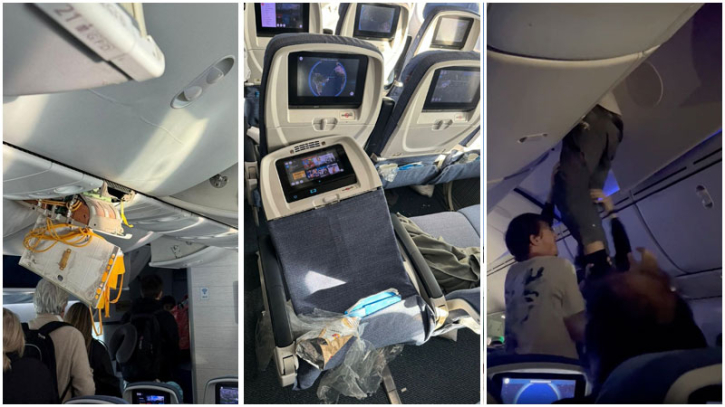Severe turbulence on Air Europa flight fractures necks and skulls

Severe air turbulence on an Air Europa flight injured more than two dozen passengers and forced an emergency landing in the seaside city of Natal, Brazil, says the New York Times.
The flight, UX045, to Uruguay from Spain was more than four hours from Madrid when the incident occurred, leaving several with neck and skull fractures.
Previously rare, this is the second incident of violent turbulence resulting in injuries in less than a month.
Some passengers hit their heads during the turbulence, resulting in head, neck and chest injuries, according to Brazilian public health officials. Thirty-six passengers were treated for injuries and 23 were taken to a hospital, according to health and airport officials.
Some of the passengers who received treatment were suffering from shock but no physical injuries, officials said. By Monday evening, five passengers were still hospitalised, four of them in intensive care, officials said.
Passengers described a frightening scene on the Boeing 787 jet, with some people flying through the cabin. Two women told the news channel Telemundo that at least one passenger flew out of his seat and became embedded in the plane's ceiling area.
Two videos posted on social media appeared to show a man lying in an area near or above the plane's overhead bins and then being helped down by two other passengers. Other photos and videos showed broken ceiling panels and seats.
"A person was left hanging between the plastic ceiling and the metal roof behind it, and they had to be brought down," Evangelina Saravia, a passenger from Uruguay, told Telemundo. "The same thing happened to a baby."
Another passenger, Romina Apai, said she had been sitting next to the man who became embedded in the ceiling. "He flew and got stuck in the roof, in the bin — we couldn't find him," she told Telemundo. When the plane stabilised, she added, "people fell on top of seats, on top of other people."
It is relatively rare for turbulence to cause such severe injuries. Just 163 serious injuries from aircraft turbulence were registered in the United States between 2009 and 2022, according to the Federal Aviation Administration.
But Monday's episode is the second such case in less than a month. In June, a 73-year-old man died when the Singapore Airlines flight he was travelling on dropped 6,000 feet in minutes. More than 70 other people on that flight were injured.
Turbulence itself is common and is typically not dangerous. It is generally caused by changes in wind speed and direction, including storms and jet streams, and can lead to sudden changes in a plane's altitude and speed. Passengers who are not wearing seatbelts can be injured because turbulence can lift them out of their seats.
Recent studies suggest that climate change can make turbulence more common because increased carbon dioxide emissions can affect air currents.
.png)




